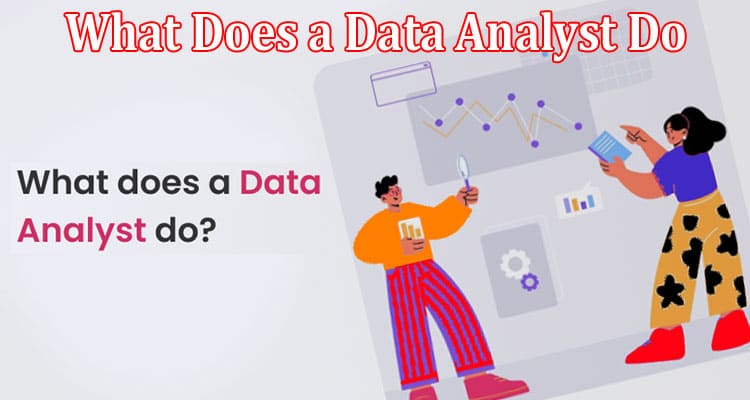What Does a Data Analyst Do?
In a world where information reigns supreme, data analysis emerges as the linchpin, providing the power to decode the complex tapestry of data and unearth invaluable insights. The alchemists of the digital age, data analysts blend the art of storytelling with the science of numbers, unraveling the mysteries concealed within vast datasets. With each stroke of their analytical brush, they paint a picture of knowledge that guides decision-making, propelling businesses and organizations to success.
The Data Analytics Course equips aspiring Data Analysts with the essential skills to master the art of examining, interpreting, and presenting data. It empowers individuals to unlock the hidden insights within vast datasets, enabling them to make data-driven decisions and drive positive impact in diverse industries.
This article embarks on an enchanting exploration of the captivating world of data analysis, discovering the multifaceted role of data analysts, the magical skills they wield, and the ethical considerations that illuminate their path.
1. Unraveling the Role of Data Analysts
Imagine a data analyst as an ardent explorer, traversing the uncharted territories of data with a burning desire to unlock its secrets. Their primary mission is to examine, interpret, and present data in a manner that empowers decision-makers. Armed with an insatiable curiosity, data analysts play a pivotal role across diverse industries such as finance, marketing, healthcare, and technology. They are the bridges that connect the dots between raw data and actionable insights, turning scattered information into a cohesive narrative that drives progress.
As torchbearers in a data-driven world, data analysts possess the key to revolutionizing businesses and organizations. They embark on an exhilarating journey, unearthing hidden patterns, identifying trends, and building predictive models that illuminate the path ahead. By delving into the vast ocean of data, they reveal opportunities for growth, untapped potential, and avenues for optimizing processes.
2. The Skillset of a Data Analyst
Stepping into the realm of data analysis demands a versatile and dynamic skillset. At the foundation lies technical expertise, encompassing proficiency in data collection methodologies, data manipulation using tools like SQL and Excel, and fluency in programming languages like Python or R. These technical skills empower data analysts to dive deep into datasets and derive meaning from seemingly chaotic information.
However, the true magic of a data analyst lies beyond technical prowess. They are the translators of the data language, equipped with exceptional communication skills. Like skilled artists, data analysts have the innate ability to breathe life into raw numbers, transforming them into engaging stories that resonate with stakeholders. They bridge the gap between the intricate world of data and the human context, weaving a narrative that captivates the minds of those who seek wisdom from the data’s depths.
3. From Raw Data to Actionable Insights
Embark on a thrilling expedition as data analysts embark on their quest to tame the unruly realm of raw data. The adventure commences with data collection, gathering information from disparate sources, ranging from internal databases to external repositories and streams from the Internet of Things (IoT). But raw data is like a tangled jungle, concealing valuable insights amidst the chaos.
Data analysts step into the role of explorers, commencing the crucial task of cleaning and preprocessing the data. Armed with meticulous attention to detail, they eliminate imperfections, address missing values, and ensure the data is polished and reliable. Only then can the real journey commence.
Enter the heart of the exploration phase, where data analysts venture into the depths of the data landscape. They craft powerful visualizations, summoning patterns and trends from the labyrinth of numbers. In this captivating stage, potential areas for growth, innovation, and optimization are unveiled, guiding stakeholders towards opportunities they may have never imagined.
But the true marvel of a data analyst emerges during the analysis phase. Enlisting statistical methods and deploying machine learning techniques, they dive deeper into the data’s essence. This is the moment of epiphany, where data analysts unlock profound insights and predictions that have the potential to shape the future of businesses and industries.
4. Data Analysts as Storytellers
Beyond the realm of data and algorithms, data analysts ascend to the status of enchanting storytellers. They grasp the significance of context and relatability, recognizing that dry numbers alone may not capture hearts and minds. By translating complex analyses into vivid narratives, data analysts ignite the spark of understanding in their audience.
Picture a data analyst unveiling the tale of a struggling business, tracing the patterns that led to its decline, and finally, presenting a path to resurgence. Through their narratives, data analysts inspire action, trigger innovation, and evoke emotions that drive positive change. They forge a connection between data and human decision-making, fostering a culture of data-driven insights and informed choices.
5. The Role in Business Strategy
Data analysts emerge as the strategic architects, guiding businesses through turbulent waters towards success. By analyzing market trends, customer preferences, and competitor performance, they offer a compass that points towards prosperity. Armed with data-driven insights, businesses can navigate the dynamic landscape with confidence, making well-informed decisions that lead to increased efficiency, reduced costs, and heightened customer satisfaction.
But their responsibility transcends the role of navigators; data analysts serve as diligent watchdogs as well. Through performance tracking and Key Performance Indicators (KPIs), they monitor the effectiveness of business strategies. This feedback loop ensures businesses remain on course, empowering them to adapt and evolve in response to changing circumstances.
6. Ethical Considerations in Data Analysis
As data analysts bask in the glow of newfound power, they must wield it responsibly. Ethical considerations serve as guiding stars in their journey, ensuring that data privacy and security remain paramount. They hold the sacred duty of safeguarding sensitive information, ensuring that the trust bestowed upon them is never betrayed.
Moreover, data analysts are vigilant guardians against potential biases that could taint their analyses. By acknowledging and mitigating biases, they preserve the integrity of their work, guaranteeing that their insights are impartial and equitable. Upholding ethical standards, data analysts ensure that the data-driven world remains a realm of fairness, equality, and integrity.
Conclusion
Data analysts are the artisans of the data-driven renaissance, transforming raw data into the elixir of success for businesses and organizations alike. Their blend of technical mastery and storytelling prowess empowers businesses to thrive in a rapidly evolving world. As technology continues its relentless march forward, the significance of data analysts will only deepen, solidifying their position as the pioneers who illuminate the path ahead. So, the next time you encounter a data analyst weaving their magic, marvel at the captivating stories they unveil from the depths of raw numbers, empowering humanity with knowledge in this wondrous era of data exploration.




